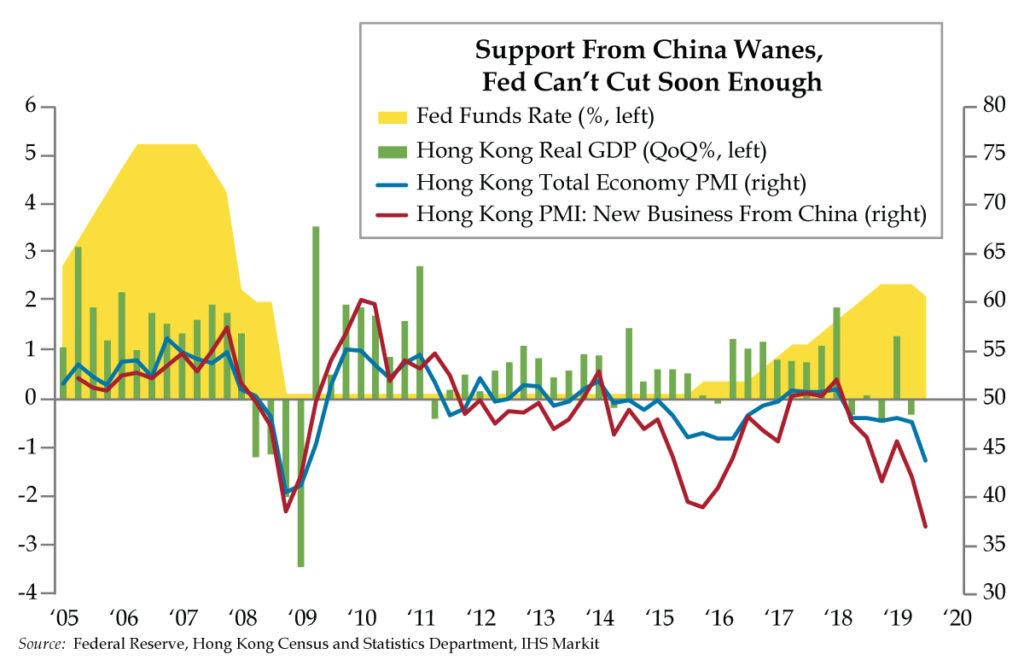Authored by Danielle DiMartino Booth via QuillIntelligence.com,
-
As the Hong Kong protests enter their 11th week, Chinese authorities may be disappointed given nine out of ten students support a campaign to boycott classes after school resumes September 2nd
-
Hong Kong enjoys the 11th highest per capita worldwide on a purchasing power parity basis, one notch above that of the U.S. and nearly four times that of 79th ranked China; its stock market is the world’s fifth largest and Hong Kong is the priciest property market in the world
-
The protests are beginning to harm the economy – in 2018, tourism was 11% over the prior year, but has since declined by a third; in addition to the trade war drag, the protestors are encouraging the boycott of unsympathetic retailers further speeding the onset of recession
In the Chinese culture, one was truly the loneliest number. The more of the single digits you lined up in a row, the lonelier the theoretical path. Enter four enterprising, albeit lonely male students living in Mingcaowuzhu, the all-male dorm at Nanjing University in 1993. Rather than shun November 11th, as in four consecutive calendric ‘1’s,’ the foursome decided to mark the day with celebrations in honor of being single. The funny thing about celebrations is that they bring people together. The tradition spread from the university to a modern-day, social media driven China, in need of a good excuse to party at an appointed date and time once a year.
Another enterprising group found its own way for the Chinese population to celebrate. The Chinese economy has long been short on consumption as a percentage of its economy. In a genius move, Alibaba capitalized on the happy mood of Singles Day, November 11th, to launch a shopping day Bezos can only envy. 2018 Singles Day’s sales raked in $30 billion, multiples of Amazon’s $7 billion 48-hour haul a month ago. It’s likely Jack Ma is among those hoping the turmoil in the streets of Hong Kong passes after classes resume September 2nd. Even as shares in the online retailer he co-founded are off 12%, the pro-business icon is said to be weighing a $20 billion secondary listing in Hong Kong.
Li Ka-shing can empathize with the body blow withstood by Ma’s net worth. Hong Kong’s wealthiest man has borne more than $3 billion in paper losses since the end of July. Even so, Twitter was alive with claims that one of the full-front-page ads that Li, the 91-year old property tycoon, placed in Friday’s papers contained a hidden message to “Allow Hong Kong to police itself.” Later Friday, Reuters quoted Li as saying that “The young always fear the future has nothing to do with them,” while adding that he believed “the government heard the messages from the protesters loud and clear and [were] diligently racking their brains for solutions.”
As the protests enter their 11th lonely week, Chinese authorities can only hope students have no intention of staging 11 more weeks of protests which would carry them past Singles Day into the first week of November. Curiously, in other cultures, the number 11 symbolizes rebellion and victory for those who survive and emerge with acquired knowledge. Indeed, in a survey released Friday taken by democracy party Demosisto and two student organizations, nine in ten students said they supported a campaign to boycott classes “to express their concerns on the social injustice and show their determination for democracy in Hong Kong.”
QI stands in unity with the students chanting for a free and independent Hong Kong but fears they will not prevail. The semi-autonomous territory was retroceded to China in 1997 and its government was never intended to be representative despite Hong Kong being culturally, politically and linguistically distinct from mainland China. More to the point, what would ever compel Chinese authorities to relinquish hold of one of its most prized possessions?
As a stand-alone, Hong Kong’s economy of $363 billion places it 35th worldwide. With a population of only 7.45 million, that’s saying something. When the effects of currency are normalized via purchasing power parity, Hong Kong’s GDP per capita was $64,794 in 2018, coming in 11th (there’s that number again) worldwide, one notch above that of the U.S. and nearly four times that of 79th ranked China.
But, what makes Hong Kong really stand out is its financial standing. The stock market is the world’s fifth largest while it boasts the priciest property market on the planet. Tourists flock to Hong Kong – some 65 million visited last year, up 11% over the prior year.
Looking at Hong Kong’s success from a different angle is the Heritage Foundation which maintains an Index of Economic Freedom. Of Hong Kong retaining its top global ranking in 2019, Heritage cited, “increases in scores for trade freedom, monetary freedom, and government integrity countered by a decline in judicial effectiveness.”That last part was prescient given the ongoing protests were initially triggered by a for now-shelved extradition bill that would allow the handover of suspects to other jurisdictions, including mainland China, thus eroding Hong Kong’s judicial independence.
It’s difficult to quantify the effects of the trade war on Hong Kong given trade is 375% of its economy with, by the way, 0% tariffs. What we do observe in today’s graph is that fresh business with an ailing China is at a record low in a series that began in 2005. With the added pressure of the targeted protests, critical tourism is off by a third.
It looks as if commerce will follow. A new online campaign called “Bye Buy Day HK” urges activists to spend less and shun retailers and firms unsympathetic to the cause. Call it the opposite of Singles Day on the mainland with this last effort likely to push the territory into recession this year.
via ZeroHedge News https://ift.tt/30eENGu Tyler Durden
